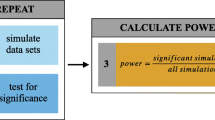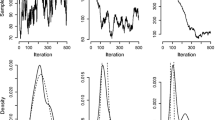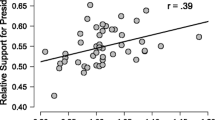Abstract
There are results which show that measure-theoretic deterministic models and stochastic models are observationally equivalent. Thus there is a choice between a deterministic and an indeterministic model and the question arises: Which model is preferable relative to evidence? If the evidence equally supports both models, there is underdetermination. This paper first distinguishes between different kinds of choice and clarifies the possible resulting types of underdetermination. Then a new answer is presented: the focus is on the choice between a Newtonian deterministic model supported by indirect evidence from other Newtonian models which invoke similar additional assumptions about the physical systems and a stochastic model that is not supported by indirect evidence. It is argued that the deterministic model is preferable. The argument against underdetermination is then generalised to a broader class of cases. Finally, the paper criticises the extant philosophical answers in relation to the preferable model. Winnie’s (1998) argument for the deterministic model is shown to deliver the correct conclusion relative to observations which are possible in principle and where there are no limits, in principle, on observational accuracy (the type of choice Winnie was concerned with). However, in practice the argument fails. A further point made is that Hoefer’s (2008) argument for the deterministic model is untenable.
Similar content being viewed by others
References
Benedicks M., Young L.-S. (1993) Sinai–Bowen–Ruelle-measures for certain Hénon maps. Inventiones Mathematicae 112: 541–567
Berkovitz J., Frigg R., Kronz F. (2006) The ergodic hierarchy, randomness and Hamiltonian chaos. Studies in History and Philosophy of Modern Physics 37: 661–691
Butterfield, J. (2005). Determinism and indeterminism. Routledge Encyclopaedia of Philosophy Online.
Chernov N., Markarian R. (2006) Chaotic Billiards. American Mathematical Society, Providence
Frigg R. (2008) A field guide to recent work on the foundations of statistical mechanics. In: Rickles D. (Ed.) The Ashgate companion to contemporary philosophy of physics. Ashgate, London, pp 99–196
Hoefer, C. (2008). Causal determinism. In E. Zalta (Ed.), The Stanford encyclopaedia of philosophy (Winter 2008 Edition). Stanford. http://plato.stanford.edu/archives/win2008/entries/determinism-causal/.
Ladyman J. (2002) Understanding philosophy of science. Routledge, London
Laudan L., Leplin J. (1991) Empirical equivalence and underdetermination. The Journal of Philosophy 88: 449–472
Lorenz E. (1963) Deterministic nonperiodic flow. Journal of the Atmospheric Sciences 20: 130–141
Luzzatto S., Melbourne I., Paccaut F. (2005) The Lorenz attractor is mixing. Communications in Mathematical Physics 260: 393–401
May R.M. (1976) Simple mathematical models with very complicated dynamics. Nature 261: 459–467
Moretti L. (2007) Ways in which coherence is confirmation conducive. Synthese 157: 309–319
Okasha S. (1998) Laudan and Leplin on empirical equivalence. The British Journal for the Philosophy of Science 48: 251–256
Okasha S. (2002) Underdetermination, holism and the theory/data distinction. The Philosophical Quarterly 208: 303–319
Ornstein D., Galavotti G. (1974) Billiards and Bernoulli schemes. Communications in Mathematical Physics 38: 83–101
Ornstein D., Weiss B. (1991) Statistical properties of chaotic systems. Bulletin of the American Mathematical Society 24: 11–116
Petersen K. (1989) Ergodic theory. Cambridge University Press, Cambridge
Pitowsky I. (1996) Laplace’s demon consults an oracle: The computational complexity of prediction. Studies in History and Philosophy of Modern Physics 27(2): 161–180
Simányi N. (1999) Ergodicity of hard spheres in a box. Ergodic Theory and Dynamical Systems 19: 741–766
Simányi N. (2003) Proof of the Boltzmann–Sinai ergodic hypothesis for typical hard disk systems. Inventiones Mathematicae 154: 123–178
Stanford P. (2001) Refusing the devil’s bargain: What kind of underdetermination should we take seriously?. Philosophy of Science (Supplement) 68: S1–S12
Suppes P. (1993) The transcendental character of determinism. Midwest Studies in Philosophy 18: 242–257
Suppes P., de Barros A. (1996) Photons, billiards and chaos. In: Weingartner P., Schurz G. (eds) Law and prediction in the light of chaos research. Springer, Berlin, pp 190–201
Werndl C. (2009a) Are deterministic descriptions and indeterministic descriptions observationally equivalent?. Studies in History and Philosophy of Modern Physics 40: 232–242
Werndl C. (2009b) Deterministic versus indeterministic descriptions: Not that different after all?. In: Hieke A., Leitgeb H. (eds) Reduction, abstraction, analysis, proceedings of the 31st international Ludwig Wittgenstein-symposium. Ontos, Frankfurt, pp 63–78
Werndl C. (2009c) What are the new implications of chaos for unpredictability. The British Journal for the Philosophy of Science 60: 195–220
Werndl C. (2011) On the observational equivalence of continuous-time deterministic and indeterministic descriptions. European Journal for the Philosophy of Science 1(2): 193–225
Winnie J. (1998) Deterministic chaos and the nature of chance. In: Earman J., Norton J. (eds) The cosmos of science–essays of exploration. Pittsburgh University Press, Pittsburgh, pp 299–324
Author information
Authors and Affiliations
Corresponding author
Rights and permissions
About this article
Cite this article
Werndl, C. On choosing between deterministic and indeterministic models: underdetermination and indirect evidence. Synthese 190, 2243–2265 (2013). https://doi.org/10.1007/s11229-011-9966-9
Received:
Accepted:
Published:
Issue Date:
DOI: https://doi.org/10.1007/s11229-011-9966-9




